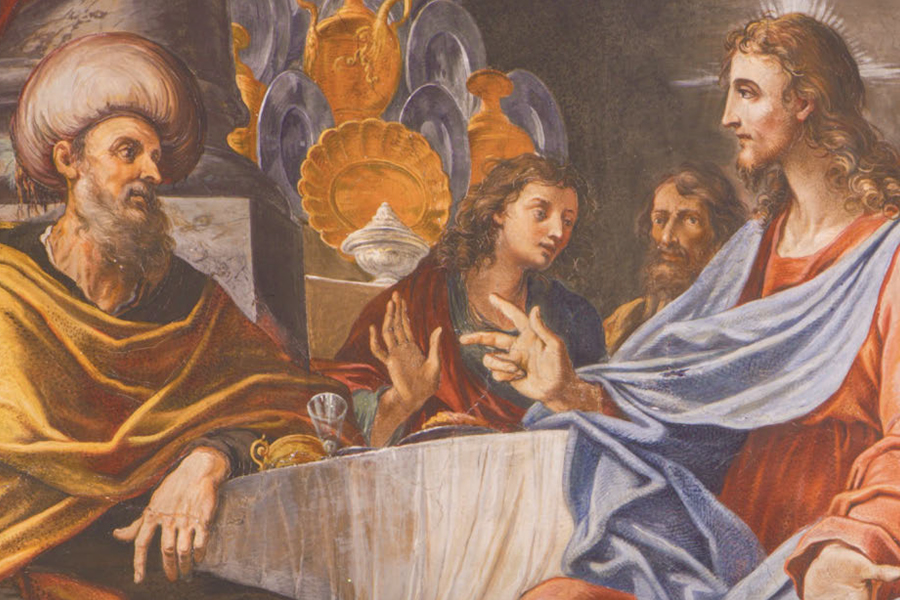St. Francis of Assisi Weekly Reflections
Seeking Humility
08-28-2022Question of the WeekReading I: Sirach 3:17-18, 20, 28-29 - Humility
Reading II: Hebrews 12:18-19, 22-24a - God the judge; Jesus the mediator
Gospel: Luke 14:1, 7-14 - A lesson in humility
Key Passage: Jesus said, “But when you give a banquet, invite the poor, the crippled, the lame, and the blind. And you will be blessed, because they cannot repay you, for you will be repaid at the resurrection of the righteous.” (Luke 14:13–14)
Adults: Has the hunger for status and influence in the world around you endangered your life as a Christian?
Kids: Does it make you a better person to be chosen first for a team or some other honor? Why or why not?
Buscando la Humildad
Lectura I: Eclesiástico 3, 17-18, 20, 28-29 - Humildad
Lectura II: Hebreos 12:18-19, 22-24a - Dios el juez; Jesús el mediador
Evangelio: Lucas 14, 1, 7-14 - Una lección de humildad
Pasaje Clave: Jesús dijo: “Al contrario, cuando des un banquete, invita a los pobres, a los lisiados, a los cojos y a los ciegos; y serás dichoso, porque ellos no tienen con qué pagarte, pero ya se te pagara, cuando resuciten los justos”. (Lucas 14:13–14)
Adultos: ¿El hambre del estatus e influencia en el mundo que te rodea ha puesto en peligro tu vida como cristiano?
Niños: ¿Te hace una mejor persona ser elegido primero para un equipo o algún otro honor? ¿Por qué o por qué no?

The Poor are Welcomed and the Humble are Exalted
08-28-2022Weekly ReflectionWe Celebrate Worship Resource, Vol. 47, No. 3Seeing guests gravitate toward a place of honor in the home of prominent Pharisee, Jesus preaches humility, pointing out that at a wedding banquet it’s far better to be promoted to a better seat in front of your peers that to be demoted to the back of the room. It’s sound advice, to be sure, but remember this is a parable. As in other parables, the “wedding banquet” is God’s kingdom, the feast to which we are all invited, but one in which God’s grace, not our own sense of self-importance, determines our placement. God will elevate the humble. Then Jesus directs his attention to the host, reproving him for inviting only pompous people who trip over each other to get good seats. Instead, invite to your feast those who can’t reciprocate—the hungry, the poor, those who do not even have a home. This parallels his account of the last judgment, when the king welcomes those who gave food to the hungry and drink to the thirsty, since in doing so they were doing it for Christ. The ultimate feast is in the kingdom of God, where the poor are welcomed and the humble are exalted.
How can you approach God with humility? How can you or your parish invite those who cannot repay you?
Los Pobres son Acogidos y los Humildes son Exaltados
Al ver a los invitados gravitar hacia un lugar de honor en la casa de un fariseo prominente, Jesús predica la humildad, señalando que en un banquete de bodas es mucho mejor ser promovido a un mejor asiento frente a tus compañeros que ser degradado a la parte posterior de la habitación. Es un buen consejo, sin duda, pero recuerda que esto es una parábola. Como en otra parábola, el “banquete de bodas” es el reino de Dios, la fiesta a la que todos estamos invitados, pero en la que la gracia de Dios, no nuestro propio sentido de importancia personal, determina nuestra ubicación. Dios elevará a los humildes. Entonces Jesús dirige su atención al anfitrión, reprochándolo por invitar solo a personas pomposas que tropiezan entre sí para conseguir buenos asientos. En cambio, invite a su fiesta a aquellos que no pueden corresponder: los hambrientos, los pobres, los que ni siquiera tienen un hogar. Esto es paralelo a su relato del juicio final, cuando el rey da la bienvenida a los que dieron de comer a los hambrientos y de beber a los sedientos, ya que al hacerlo lo hacían por Cristo. La fiesta suprema está en el reino de Dios, donde los pobres son acogidos y los humildes son exaltados.
¿Cómo puedes acercarte a Dios con humildad? ¿Cómo puedes tu o tu parroquia invitar a aquellos que no pueden reciprocar?

Strive to Enter through the Narrow Door
08-21-2022Weekly ReflectionWe Celebrate Worship Resource, Vol. 47, No. 3t’s easy to become complacent when things are going well. If we have the fortune of good health, a decent job, a loving family, and a comfortable life, we tend to relax and presume all will be well. But Jesus warns us in the Gospel that while some who were last will be first, some who are first will be last. Our material success in this world will not unlock the door to the next. To enter through the narrow door, the words of Hebrews may help. Discipline (from Latin disciplina, meaning “teaching”...the same root as for “disciple”), which the Lord gives out of love, is painful when it is applied but it brings joy in the end. Above all, however, it is divine mercy that unlocks the door. Jesus tells us that God’s mercy admits those “from the east and the west and from the north and the south” (Luke 13:29), echoing Isaiah, who names places in Africa, Asia, and Europe as the origins of those streaming into the new Jerusalem. May God’s wide mercy rescue us from our complacency and guide us through the narrow door!
How have you become complacent? What discipline can raise you out of it?
Esfuércense en Entrar por la Puerta Angosta
Es fácil volverse complaciente cuando las cosas van bien. Si tenemos la fortuna de una buena salud, un trabajo decente, una familia amorosa y una vida cómoda, tendemos a relajarnos y suponer que todo estará bien. Pero Jesús nos advierte en el Evangelio que mientras algunos que fueron últimos serán primeros, algunos que son primeros serán últimos. Nuestro éxito material en este mundo no abrirá la puerta al siguiente. Para entrar por la puerta angosta, las palabras de Hebreos pueden ayudar. La disciplina (del latín disciplina, que significa “enseñanza”...la misma raíz que “discípulo”), que el Señor da por amor, es dolorosa cuando se aplica pero al final trae alegría. Sin embargo, sobre todo es la misericordia divina la que abre la puerta. Jesús nos dice que la misericordia de Dios admite a los “del oriente y del poniente, del norte y del sur” (Lucas 13:29), haciéndose eco de Isaías, quien menciona lugares en África, Asia y Europa como los orígenes de los que fluyen hacia la nueva Jerusalén. ¡Que la amplia misericordia de Dios nos rescate de nuestra complacencia y nos guíe por la puerta estrecha!
¿Cómo te has vuelto complaciente? ¿Qué disciplina puede sacarte de ella?
The Narrow Door
08-21-2022Question of the WeekReading I: Isaiah 66:18-21 - Gathering of the nations
Reading II: Hebrews 12:5-7, 11-13 - The discipline of God
Gospel: Luke 13:22-30 - The narrow door Key Passage: Jesus answered them, “Strive to enter through the narrow door; for many, I tell you, will try to enter and will not be able.” (Luke 13:24)
Adults: What daily choices are you making that will allow you to be recognized at the doorway of the reign of God?
Kids: What good habits are you practicing in order to be a good Christian?
La Puerta Angosta
Lectura I: Isaías 66,18-21 - Reunión de las naciones
Lectura II: Hebreos 12:5-7, 11-13 - La disciplina de Dios
Evangelio: Lucas 13,22-30 - La puerta estrecha Pasaje Clave: Jesús les respondió: “Esfuércense por entrar por la puerta, que es angosta, pues yo les aseguro que muchos tratarán de entrar y no podrán.” (Lucas 13:24)
Adultos: ¿Qué elecciones diarias estás haciendo que te permitirán ser reconocido en la puerta del reino de Dios?
Niños: ¿Qué buenos hábitos estás practicando para ser un buen cristiano?

Don't Lose Heart
08-14-2022Weekly ReflectionWe Celebrate Worship Resource, Vol. 47, No. 3We like to visualize the Holy Spirit coming as a dove, a symbol of peace. But at Pentecost the Holy Spirit descended upon the Apostles as tongues of fire. Fire has a much different connotation, suggesting danger and destruction. This is the image Jesus used in today’s Gospel. He has begun his journey to Jerusalem, so heavy on his mind is the knowledge that he will face people with evil in their hearts, people who are willing to put that evil into action. Like Jeremiah in the first reading, Jesus has angered the political and religious authorities. At this point peace is not his goal. First, the evil in people’s hearts must be destroyed. When ignored, evil can flourish, spreading among those willing to look the other way, infecting an entire household or a whole community. Jesus would rather a family be divided than corrupted. The Holy Spirit, who comes to us in baptism, gives us the wisdom and fortitude to confront evil and the purifying fire to cauterize it before it spreads. May our Lord inspire us to do so, for “he endured such opposition from sinners, in order that (we) may not grow weary and lose heart” (Hebrews 12:3).
When have you felt prompted to stand up to evil? When have you done so and when have you failed to do so?
No Pierdas el Ánimo
Nos gusta visualizar al Espíritu Santo viniendo en forma de paloma, símbolo de paz. Pero en Pentecostés el Espíritu Santo descendió sobre los Apóstoles como lenguas de fuego. El fuego tiene una connotación muy diferente, sugiriendo peligro y destrucción. Esta es la imagen que usó Jesús en el Evangelio de hoy. Ha comenzado su viaje a Jerusalén, tan pesado en su mente es el conocimiento de que se enfrentará a personas con maldad en sus corazones, personas que están dispuestas a poner esa maldad en acción. Como Jeremías en la primera lectura, Jesús ha enojado a las autoridades políticas y religiosas. En este punto, la paz no es su objetivo. Primero, el mal en los corazones de las personas debe ser destruido. Cuando se ignora, el mal puede florecer, extendiéndose entre aquellos dispuestos a mirar hacia otro lado, infectando a toda una familia o a toda una comunidad. Jesús preferiría una familia dividida que corrompida. El Espíritu Santo, que viene a nosotros en el bautismo, nos da la sabiduría y la fortaleza para afrontar el mal y el fuego purificador para cauterizarlo antes de que se propague. Que nuestro Señor nos inspire a hacerlo, porque “sufrió tal contradicción de pecadores contra sí mismo, para que nuestro ánimo no se canse hasta desmayar” (Hebreos 12:3).
¿Cuándo te has sentido impulsado a hacer frente al mal? ¿Cuándo lo ha hecho y cuándo no lo ha hecho?
An Unsettling Truth
08-14-2022Question of the WeekReading I: Jeremiah 38:4-6, 8-10 - Jeremiah in the miry cistern
Reading II: Hebrews 12:1-4 - God's treatment of his sons and daughters
Gospel: Luke 12:49-53 - Jesus' mission of division
Key Passage: Jesus said, “Do you think that I have come to bring peace to the earth? No, I tell you, but rather division!” (Luke 12:51)
Adults: When has your taking a strong stand on a moral issue created division rather than healing in the short term?
Kids: Is it important to do the right thing even if others are angry as a result? Why or why not?
Una Verdad Inquietante
Lectura I: Jeremías 38:4-6, 8-10 - Jeremías en la cisterna cenagosa
Lectura II: Hebreos 12:1-4 - El trato de Dios a sus hijos e hijas
Evangelio: Lucas 12, 49-53 - La misión de división de Jesús
Pasaje Clave: Jesús dijo: “¿Piensan acaso que he venido a traer paz a la tierra? De ningún modo. No he venido a traer la paz, sino división!” (Lucas 12:51)
Adultos: ¿Cuándo el hecho de tomar una posición firme sobre un tema moral ha creado división en lugar de sanación a corto plazo?
Niños: ¿Es importante hacer lo correcto incluso si los demás están enojados como resultado? ¿Por qué o por qué no?
Running the Race of Faith
08-07-2022Question of the WeekReading I: Wisdom 18:6-9 - On the death of the Egyptian firstborn
Reading II: Hebrews 11:1-2, 8-19 - Faith of the ancients
Gospel: Luke 12:32-48 - We depend on God; prepare for the master's return
Key Passage: Therefore, since we are surrounded by such great a cloud of witnesses, let us also lay aside every weight and the sin that clings so closely, and let us run with perseverance the race that is set before us, looking to Jesus the pioneer and perfecter of our faith. (Hebrews 12:1–2a)
Adults: Other than Jesus, which of the ancestors of Christian faith has served as the greatest example to you? Why?
Kids: Which person of the Bible has been a good example to you of how to live?
Corriendo la Larrera de la Fe
Lectura I: Sabiduría 18:6-9 -Sobre la muerte del primogénito egipcio
Lectura II: Hebreos 11:1-2, 8-19 -La fe de los antiguos
Evangelio: Lucas 12:32-48 - Dependemos de Dios; prepárate para el regreso del maestro
Pasaje Clave: Por tanto, nosotros, teniendo en derredor nuestro tan grande nube de testigos, despojémonos también de todo peso y del pecado que nos asedia, y corramos con perseverancia la carrera que tenemos por delante, puestos los ojos en Jesús el autor y consumador de nuestra fe.
(Hebreos 12:1–2a)
Adultos: ¿Además de Jesús, ¿cuál de los antepasados de la fe cristiana ha sido el mayor ejemplo para ti? ¿Por qué?
Niños: ¿Qué personaje de la Biblia ha sido un buen ejemplo para ti de cómo vivir?

How are you waiting for Jesus to arrive?
08-07-2022Weekly ReflectionWe Celebrate Worship Resource, Vol. 47, No. 3What are you waiting for?” We’ve certainly asked that question before and have probably directed it to others from time to time. The question, however, suggests passive waiting, not the kind of active waiting that is rewarded in Jesus’ parable today. The servants actively wait for their master’s return, girding their loins and lighting their lamps, for they are waiting in faith, expecting that he will come. The Chosen People waited in faith for their liberation, trusting in God while preparing their homes with the blood of the Passover lamb. Abraham and Sarah waited in faith for their promised descendants, trusting in God, who had enabled them to have a child in their old age. When Jesus, the master, returns to his faith-filled servants, he shares what he has brought from the feast, what he has received from the Father. For us, the irony is that our active waiting, our waiting in faith, is not just for an arrival far in the future. Jesus comes to us each and every day, often in ways we least expect: in the person in need, in grace from heaven, in the Eucharistic feast. We are called to be ever vigilant, for he is already here.
What can you do today to wait actively for Jesus’ arrival in your life?
¿Como Esperas la Llegada de Jesús?
¿Que estas esperando?" Ciertamente hemos hecho esa pregunta antes y probablemente la hemos dirigido a otros de vez en cuando. La pregunta, sin embargo, sugiere una espera pasiva, no el tipo de espera activa que se recompensa en la parábola de Jesús hoy. Los siervos esperan activamente el regreso de su amo, ceñiéndose los lomos y encendiendo sus lámparas, porque esperan con fe, esperando que él venga. El Pueblo Elegido esperó en la fe su liberación, confiando en Dios mientras preparaba sus hogares con la sangre del cordero pascual. Abraham y Sara esperaron con fe a la descendencia prometida, confiando en Dios, que les había permitido tener un hijo en su vejez. Cuando Jesús, el maestro, vuelve a sus siervos llenos de fe, comparte lo que ha traído de la fiesta, lo que ha recibido del Padre. Para nosotros, la ironía es que nuestra espera activa, nuestra espera en la fe, no es solo para una llegada en el futuro lejano. Jesús viene a nosotros todos los días, a menudo de la manera que menos esperamos: en la persona necesitada, en la gracia del cielo, en la fiesta eucarística. Estamos llamados a estar siempre alerta, porque él ya está aquí.
¿Qué puedes hacer hoy para esperar activamente la llegada de Jesús a tu vida?